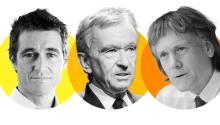Social impact and collaboration: Selin Yigitbasi-Ducker starts up outside the family

Goodsted is a platform for socially purposeful individuals and organisations who would like to volunteer their skill or donate other resources to non-profit social projects. Award-winning founder Selin Yigitbasi-Ducker, a fourth generation member of Turkish conglomerate Yasar Holdings, talks about her passion for social change, product design challenges, and inadvertently benefitting from being a next-gen.
Where did the idea for Goodsted come from?

After I graduated from my Masters in late 2017, I was determined to find opportunities to contribute to the UN Sustainable Development Goals (SDGs). While working a few days a week for our family business’ UK marketing operations, I also started looking for opportunities to volunteer my professional skills to create a positive impact, but opportunities were hard to find and weren’t matching my availability, skill sets and interests.
Throughout my masters I’d worked on digital platform design and development and I thought, ‘Why isn’t there a platform that is used by everyone to help contribute to SDGs and see the impact we help create? A platform like this could help leaders of projects get voluntary help in a more structured way’. This was the beginning of my journey with Goodsted.
How did your idea materialise into building a platform?
At the end of 2017, I was introduced by a friend to Jake Cingel who had the vision for creating Civic Makers Craft Space in South London to create a space where students and experts in woodworking can circulate waste wood materials and create purposeful wood products. He was searching for £10,000 ($12,480) through crowdfunding, but was struggling. I said, ‘Okay, you’re searching for money but, like me, there might be others who would love to be part of it—let’s create a plan for piloting your idea and raise this value through in-kind and voluntary support’. This became the first pilot of the digital platform idea.
 I set up Goodsted’s website using [free website builder] Wix and started promoting the project on there. Peckham Levels donated temporary space, students from Goldsmiths and woodworking mentors volunteered and Martin Speed donated waste art crates to repurpose into multifunctional market stalls. The total value of in-kind support raised in the end was over £20,000 ($25,000).
I set up Goodsted’s website using [free website builder] Wix and started promoting the project on there. Peckham Levels donated temporary space, students from Goldsmiths and woodworking mentors volunteered and Martin Speed donated waste art crates to repurpose into multifunctional market stalls. The total value of in-kind support raised in the end was over £20,000 ($25,000).
How did you scale up your idea into what Goodsted is now?
Once the pilot was successful, I started improving the user experience design on the platform and shared them with potential users. During this, Ruben Campos, now our tech adviser, provided his feedback and guidance. After many iterations, I decided to bring in a development team to create a basic version of the platform.

 During one of my trips back home, I visited Yasar University, which was founded by my grandfather. In the incubator of the university, I met Murat Odemis, founder of Univerlist, a university evaluation platform. His product was fully developed, so he offered to help out and provide his services within my budget.
During one of my trips back home, I visited Yasar University, which was founded by my grandfather. In the incubator of the university, I met Murat Odemis, founder of Univerlist, a university evaluation platform. His product was fully developed, so he offered to help out and provide his services within my budget.
We still have a long way to go, but the platform has continued improving and our beta version will be soft launched soon. Individuals who have social or environmental impactful ideas or projects can post challenges to get help from their community. It can be anything from, ‘Let’s help the well-being of dementia patients by hosting an art workshop’ to, ‘I need a strategy or branding for my early stage startup’. Organisations can then track and report on the activities of their volunteers and measure the value of the support.

Any challenges getting the project up and running?
There are always challenges—as an iterative process, we are always having to move and change things based on user feedback. One of the recent challenges was around an aspect of the user experience design. We realised that sometimes people would like to sign up to challenges as a team, but the ‘offering your support’ process was designed only for individuals. Now we’ve changed it so that teams can offer their support without the extra admin of making each individual submit information.
Aside from this, tackling the business tasks without a full-time team has been quite challenging—the team at the moment only work part-time because we don’t have the funding yet. Also, finding and hiring great talent is a continuous challenge and I will be looking to get support from our advisers in this process as well.
Has growing up in a big family business helped you grow the project?
Yes, it definitely did. Although I have always been determined not to get financial help from the family, I have benefitted from the networking opportunities that come from being part of a large family business—for example, connecting with my development team through Yasar University.
My family also saved a small amount of money under my name when I was a kid, so I could make use of it when I grew older. It was a big decision, but once Goodsted started showing signs of progress, I decided to spend the money as a seed funding to kick-start Goodsted.
Growing up, I have always tried to hide my family background, to be valued and accepted individually. However, I’ve realised I should be proud of what the past three generations have built with their sweat and tears, and use the opportunities to create a positive impact in the world for future generations.
What’s next for your platform and where do you see it heading in the future?
 We are now raising our first external funding, while also preparing for the soft-launch for our beta platform. We are forming partnerships with accelerators and other organisations working towards common goals. We are creating something that will make things easier and more engaging for all individuals and organisations to contribute, big or small, to SDGs. My hope is that this platform becomes the new social media go-to for next gens wanting to get involved in social change and in turn, it encourages more and more people to get involved too.
We are now raising our first external funding, while also preparing for the soft-launch for our beta platform. We are forming partnerships with accelerators and other organisations working towards common goals. We are creating something that will make things easier and more engaging for all individuals and organisations to contribute, big or small, to SDGs. My hope is that this platform becomes the new social media go-to for next gens wanting to get involved in social change and in turn, it encourages more and more people to get involved too.







